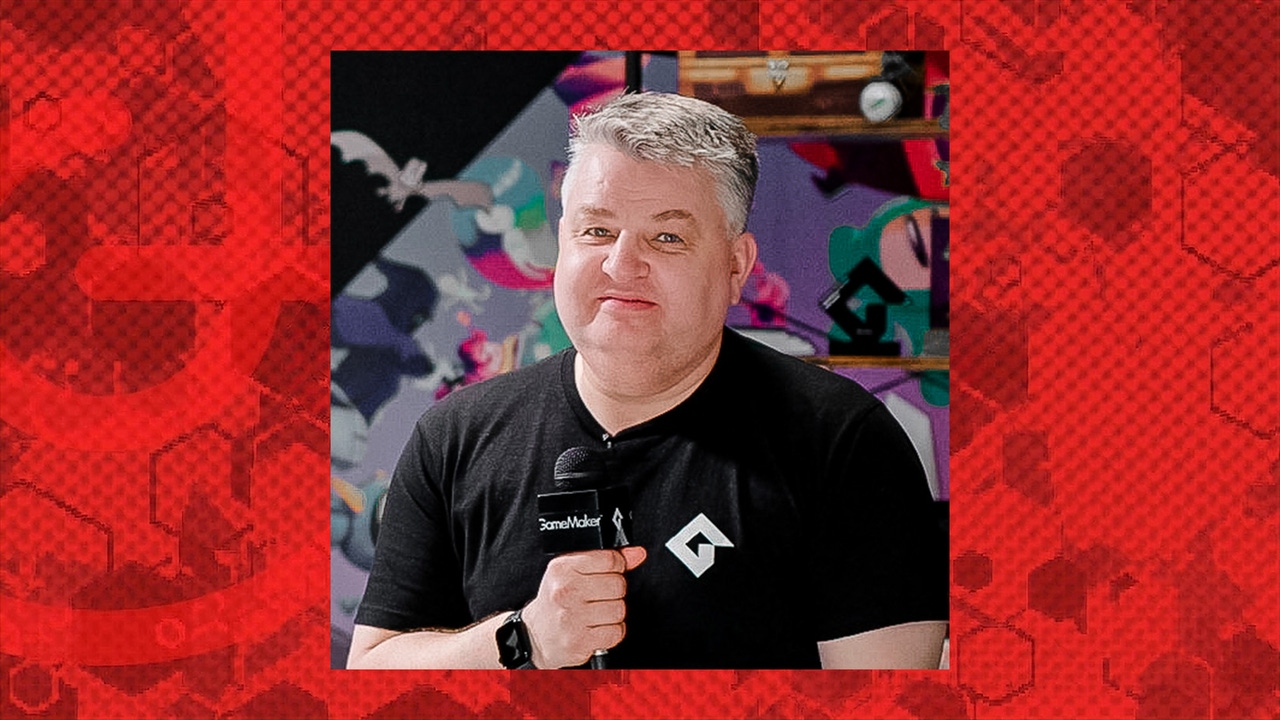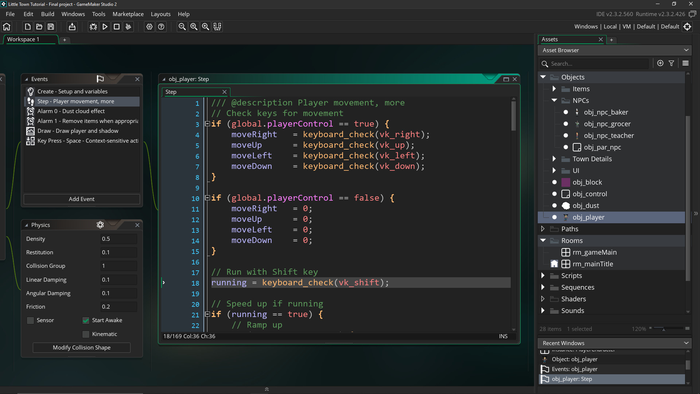Trending
Opinion: How will Project 2025 impact game developers?
The Heritage Foundation's manifesto for the possible next administration could do great harm to many, including large portions of the game development community.
Mister maker, make me a game.

Earlier this month GameMaker (now maintained by developer YoYo Games) celebrated its 25th anniversary. If it were a person, not only would it be old enough to get served at a bar, it'd be old enough to quit its day job and pursue its dreams of becoming an indie game developer.
In other words: it would be the kind of person who might be using GameMaker.
It's that kind of person (no matter their age) that makes up GameMaker's core userbase, head of Gamemaker Russell Kay said in an interview with Game Developer. 30 years ago, he was programming on games like Lemmings 2 and Grand Theft Auto, and now wishes he had a tool as sophisticated as GameMaker when he was getting started. The tool's so flexible it can be picked up by newcomers to learn the basics of game development, and also be a viable engine for commercial titles like Fields of Mistria, UFO 50, and of course Undertale. YoYo Games even made its own studio simulation game to commemorate the anniversary.
That YoYo Games (which is now owned by Opera) has survived 25 years is an accomplishment on its own: that is has done so by supporting the video game industry's smallest studios is nearly a miracle. It reached that milestone after a year of major turbulence within the game engine sector—one that began with Unity announcing a "Runtime Fee" that would charge developers on a per-install basis, and ended with it sheepishly rolling back the plan as more developers decamped for engines like Godot.
Unity and Unreal Engine maker Epic Games also both laid off hundreds of workers in that time period, running headlong into the reality that the service provider business is not the infinite money pool some had thought it would be.
With turbulence like that, what can these studios and other tool providers learn from GameMaker's long-running success?
During our chat, Kay admitted that GameMaker isn't the most sophisticated development tool on the market. That's partly because its users largely aren't programming wiz kids. He called it the "bedrooms to billions" mindset—with an emphasis more on "bedrooms" than "billions." "You have kids being able to take their ideas to a larger audience...it's the creative side, it's not necessarily the business end," he said. "It's not about trying to make the next Call of Duty, it's about thinking about the box and asking 'what's going to work?'"
The GameMaker developer community, he said, is largely filled by those "creative" developers trying to wrangle big ideas, bolstered by a supportive "technical" community that digs around in the tool and explores solutions to bring those ideas to life. The business case for working with this kind of audience is that as they learn to grow and trust GameMaker. They bring the tool with them out of their academic or hobbyist days and into their professional careers. "We would like people to not just think of GameMaker as something they picked up at school, tried, and moved on to proper game development," Kay said, going on to say he wants developers to be thinking that "GameMaker is a serious tool used by serious products, and it's well worth looking at."
![]()
Image via YoYo Games.
One of the greatest forms of support any small developer needs is the ability to ship their game—big or small—across platforms beyond PC. Kay said when he joined YoYo Games in 2009 as chief technical officer, the tool only supported PC products, and bringing any game to Mac, Linux, console, or burgeoning mobile platforms required extra work. Kay recalled that there was a shift in thinking at the company after Derek Yu released Spelunky, a game he prototyped in GameMaker but couldn't finish due to the platform limitations.
One of Kay's first major goals was to bring support for those platforms to GameMaker as fast as possible. The timing was perfect, especially with the mobile market about to positively explode with the kinds of 2D games GameMaker is good at producing. In the years since the company has been aggressive in keeping the engine current with new and emerging platforms, ranging from the PS Vita to the growing use of WebGPU.
"That's how we've been sustainable," he said. And all the while, the engine's remained "fairly stable," and today works roughly the same way as it did a decade-and-a-half ago.
"You can still open a tutorial from 15 years ago and it will mostly work," he said, glancing aside to try and recall exactly what had been made obsolete. "There'll be things that are wrong in it, but it will mostly work."
Since GameMaker debuted, the tool provider market for game developers has exploded in growth. Many software companies have sought stability by selling metaphorical shovels to metaphorical prospectors heading out to the metaphorical gold rush instead of setting out for them thar hills themselves. Many of those toolmakers are now pitching services that run on generative AI, promising developers that they can save time and money with generated assets and code—but many of them miss the mark, sometimes delivering vastly inferior products.
A creative, not-very-technically-inclined audience would be the prime candidate for such tools, right? Not necessarily, said Kay. Working with this userbase has taught him that these developers aren't always looking for the best or most efficient technical solutions. Plenty of toolmakers can mistake what they think developers need versus what they actually need, and create software that slows down the game development process.
"It's being aware that you're optimizing for the right thing," he said. For instance, an AI tool that could generate 10,000 assets sounds useful, but it's not useful if you don't know what 10,000 assets you need.
It's also helpful to remember chasing technological advancements isn't always the right move. Kay described how games made in GameMaker don't bear any stigma that sometimes comes with unrefined Unity or Unreal Engine games, because players can't immediately spot a "GameMaker game" at a distance. "It's actually quite difficult to look and say this game is made in GameMaker these days, because... you'd be surprised at the sorts of games which are actually coming through."
Because Unity and Unreal have baked-in lighting and traversal solutions, developers are sometimes locked into a certain "look" or "feel" of a game that players can unconsciously detect. When developers have resources to break away from that kind of "game feeling," or want their game to look and feel like the kind of game those solutions are optimized for, it's great. But Kay said it's sometimes more difficult to "break out of the creative box" in a 3D game engine versus a 2D one like GameMaker.
Don't expect any AI features in GameMaker any time soon, by the way. Kay said YoYo Games is "experimenting" with the technology, but hasn't found any immediate solutions ready for the game production pipeline just yet.
After Unity sparked a mass uproar among its users with the proposed Runtime Fee, GameMaker announced a price change of its own: one that made the engine free for more users and ditched subscription plans targeted at smaller developers in favor of a one-time transaction. The changes were met with open arms.
Did YoYo Games make these changes because Unity had sent many developers rushing to find new tools? Kay said the answer was "no," that the changes were in the works months before Unity turned the indie game development world on its head.
But, he sheepishly admitted, YoYo Games did "hold off" on announcing its new plans as they waited for the fallout from Unity's move to settle. He said the company has seen a "big spike" of new users in the year since. "There's a greater appreciation of other game engines, and that there is more choice out there than just Unity. [We're seeing] a distrust of large companies and people wanting to have something that's simpler and easier to get their head around."
Interestingly, Kay said YoYo didn't experience the same phenomenon Godot did, where developers cracked open the tool and expected it to work just like Unity. Because GameMaker bore fewer similarities, there was less pressure on it to meet its competitor's standards.

Image via YoYo Games.
He said he keeps in touch with the teams that oversee Godot, and that the two engines aren't exactly jockeying to fill a vacuum. Godot's open-source framework, he said, is informing how YoYo Games thinks about GameMaker's future. The company has already made some portion of its engine open source, and will likely do the same for more features in the future.
"It is a model that I think that engines need to adopt, because studios need to be able to have that ability to make bespoke versions for a particular game," Kay said. "It's a way to make optimizations that work for them, not necessarily for everybody."
There will always be some elements that YoYo has to "keep to themselves," but he sees his company's closed source-->open source approach, and Godot's open source-->closed source structure (with the forming of W4 Games) as being key directions for the future of the game engine landscape.
It's not enough to say that GameMaker made it to the 25 year mark by simply embodying a "slow-and-steady" approach. YoYo Games' ambitions have been humble, sure, but plenty of humble companies die on the vine. It's more accurate to say the company has been careful with its ambitions, and far more precise with areas it's picked to grow quickly.
Instead of abandoning the indie idea of 2D game development, the company has built a business helping developers get their 2D games in as many places as possible. Kay said he's keenly aware that the game engine marketplace has a low ceiling, which led the company to keep its headcount as small as possible.
Maybe there's something to how it views its relationship with game developers just getting their feet off the ground. Unity and Unreal are now so embedded in professional game development that their pitch to juniors and students could sometimes be described "learn to wield the same tools used by the pros."
But GameMaker's sales pitch isn't so much aimed at the aspiring professional, but the wide-eyed dreamer. Maybe if more toolmakers want to hit the 25-year mark, they should think about talking to those dreamers themselves.
Update 11/22: This story has been updated to clarify GameMaker's ownership by YoYo Games and Russell Kay's official title.
You May Also Like